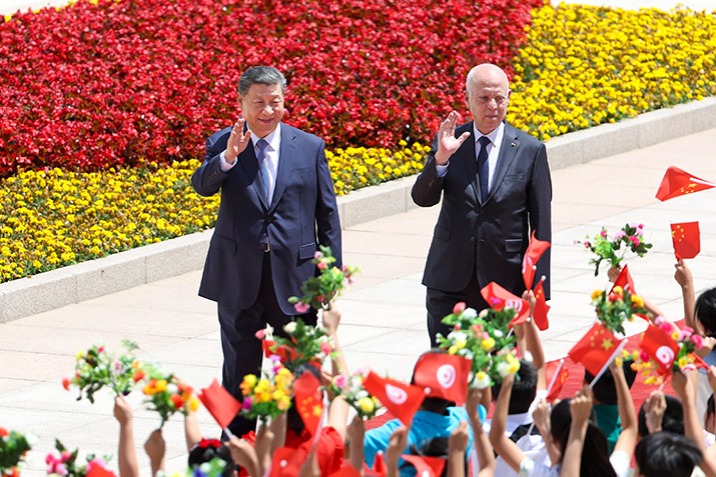More young Arabs studying Chinese as appeal spreads


Education ties between China and Arab countries have extended beyond Chinese language learning, experts said, with Mandarin education now integrated with industrial development and mutual understanding.
The popularity of the Chinese language has been rising among Arabs in recent years, with an increasing number of young people being able to write Chinese characters and speak Chinese fluently.
More Arab countries have incorporated Chinese lessons in schools, with Saudi Arabia, Egypt, the United Arab Emirates and Tunisia having included Chinese in their national education systems.
All of Saudi Arabia's public and private secondary schools started twice-weekly Mandarin lessons in August. The Saudi education department has introduced a series of incentives to encourage Chinese language learning, such as offering study tours to China as a reward for taking part in Mandarin courses.
Khawla Ahmed, a student from the University of Bahrain, said the university offers two Chinese classes for students. "I have noticed an increase in people who are interested in the Chinese language and culture," she said.
The international business student participated in an exchange program in China last month. "It was a great experience, which made me want to know more about China," she said, adding that she was considering returning to China for further study after graduation.
Omar Ahmed Mahmoud has been learning Chinese for more than three years. Interested in economics and trade, he plans to sell Chinese products including clothes, furniture and children's toys to people in his hometown of Cairo, the capital of Egypt.
He majored in Chinese language at a university in Cairo and was a postgraduate student of Chinese at Beijing Language and Culture University. He said he hopes his fluency in Chinese will be helpful in his career.
Liu Xinlu, dean of the School of Arabic Studies at Beijing Foreign Studies University, said seeking business opportunities is one of the major reasons Arabs want to learn Chinese, as trade between China and Arab countries has grown steadily over the years.
However, while education ties between China and Arab countries remain grounded in the Chinese language, they have extended beyond it in recent years, he said.
"Nowadays, many Arabs learn the Chinese language not just for translation work or traditional business, but seek to participate in numerous modern and emerging industries such as renewable energy," Liu said.
In June last year, a Confucius Institute jointly established by Shenzhen University and Prince Sultan University opened in Riyadh, capital of Saudi Arabia, aiming to deepen cooperation between the two universities in various fields.
Shenzhen University excels in science and engineering subjects such as big data and artificial intelligence.
Education ties previously focused mainly on language universities such as BFSU and BLCU, as well as Confucius Institutes teaching the language, Liu said. "These universities attracted Arab students expecting to learn Mandarin in China," he said.
But language education is now being integrated with national plans in Arab countries such as Saudi Vision 2030, which aims to increase economic diversification and develop cutting-edge technology, he said.
"Students may learn the language first, and pursue further education in other STEM subjects that China is good at," Liu said, using the acronym for science, technology, engineering and math.
Through language learning, young people from Arab countries gradually become intrigued by Chinese civilization, philosophy and the country's path of modernization, he said.
Talent exchange programs have been helping young people from China and Arab countries understand their common values.
Liu said that during the upcoming summer vacation, BFSU will invite young Sinologists to attend courses on campus about issues including modern Chinese culture and China's development experience. Young doctoral candidates or lecturers from China would also take part in discussions, he said.
Alanood Al Ali, a student at United Arab Emirates University, said she finally realized her dream of visiting China after learning Chinese for a year at a Confucius Institute.
"We are able to gain a comprehensive and multifaceted understanding of China by studying Chinese and participating in the exchange program," Alanood said in Beijing last month at the opening ceremony of the Chinese Bridge spring camp for students from Gulf Cooperation Council countries.
"The experience will not only enrich us personally but will also strengthen relations between our countries, particularly fostering exchanges among young students."
- Former Shandon political advisor imprisoned for accepting bribes
- Australia launches studies program for China-Australia exchange
- Harbin Institute of Technology celebrates group student wedding with special diamonds
- Beijing hospital promotes clinical trial awareness and participation
- Community cinema: open-air magic in Yinchuan nights
- Drone captures rare moment: Porpoises frolic at sea


































